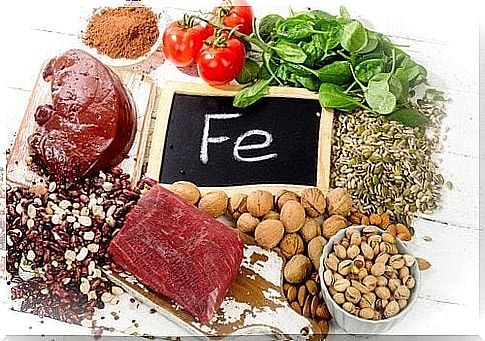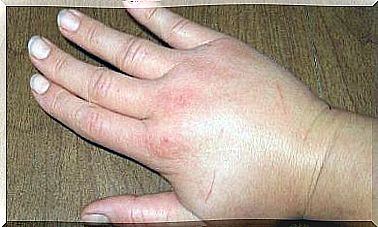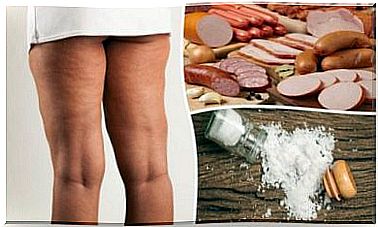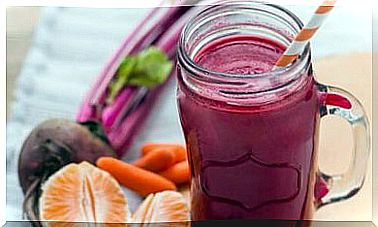Foods To Consume To Increase Your Iron Levels
To maintain optimal iron levels, it is important to eat a healthy and balanced diet. Too much iron is also bad for your health.

Iron is a mineral that actively participates in the proper functioning of the body. It participates in the synthesis of DNA and the formation of collagen. Are you monitoring your iron levels?
It also strengthens defenses to fight disease, and produces hormones as well as connective tissue.
However, the main mission of iron is to transport and store oxygen.
It also participates in the process of cellular respiration when it produces:
- of the hemoglobin, red cell protein that carries oxygen from the lungs to other parts of the body;
- myoglobin, a similar protein that can transport oxygen to muscles.
There are two types of iron depending on the type of food it is in:
- heme iron, it is found in animal products and is easily absorbed;
- non-heme iron, it is absorbed in very small amounts, about 3 to 8%, and it is found in foods of plant origin.
How much should you consume to have a good level of iron?

Depending on age, diet, gender, and other factors, the need for iron varies.
In the following list, you will find the most representative examples:
- babies up to 6 months – 0.27 mg
- children 4 to 8 years old – 10 mg
- adult men 19-50 years old – 8 mg
- adult women 19 to 50 years – 18 mg
- adolescents and pregnant women – 27 mg
- women during lactation – 9 mg
The numbers reveal an interesting piece of information: Adult and pregnant women need more iron than men because of their body processes.
Foods rich in iron
As mentioned earlier, iron is a mineral that can be found naturally in foods, both from animal and plant sources.
Here is a list of foods that will increase your iron levels:
- poultry (especially red meats) and eggs
- red meats without fat, such as beef
- clams and other molluscs
- Salmon
- dried fruits: prunes, raisins, apricots
- cereals and breads
- legumes: soybeans, lentils, peas, beans, broad beans
- vegetables: spinach, broccoli, cabbage, kale, asparagus, dandelion leaves
- whole grains: wheat, oats, brown rice
Iron found in foods of plant origin is less well absorbed by the body than iron found in foods of animal origin.
To help the body to absorb iron, it is essential to also eat foods rich in vitamin C.
Vitamin C is an ascorbic acid which facilitates the absorption of iron in the gastrointestinal tract, and which allows a better mobilization of the resources stored in the body.
Should I increase my iron levels?
For those not directly involved with medicine or nutrition, recognizing the symptoms of iron deficiency in the body can be a complex task.
However, there are a few signs and circumstances that can identify red flags.
Low iron levels can lead to anemia. Anemia is a condition in which the body does not produce enough hemoglobin in the blood.
Symptoms of anemia or low hemoglobin in the blood
The symptoms are as follows:
- pallor
- asthenia
- lack of air during physical exercise
- muscle fatigue
- lack of strength
- cold hands and feet
- neurological disorders: nausea, headache, dizziness
- kidney changes: edema or swelling of the legs
- increased rate of heartbeat
People who eat a vegetarian diet should consume twice the recommended daily amount of iron, since the body is less able to absorb iron from foods of plant origin.
The risks of excess iron

Consuming foods rich in iron is a good thing, as long as your diet is balanced and supervised by a doctor. Otherwise, the following symptoms may appear:
- gastric disturbances
- constipation
- vomiting
In some cases, it is even possible that faults appear in the functioning of certain organs, or that the body is affected by hemochromatosis, which would worsen your state of health.
Also, excessive iron consumption can increase the risk of suffering from diseases, such as breast cancer, an irregular heart rate, or cirrhosis of the liver.
This is why the dynamics of this mineral in the body should not be taken lightly.
Keeping your iron levels in check is very important, and the best way to do this is to have regular blood tests.
We must not forget that a varied and balanced diet is the basis of good health.









